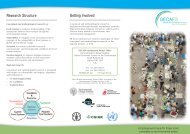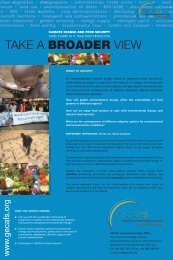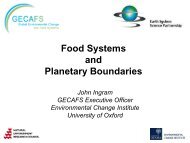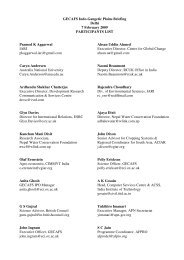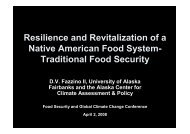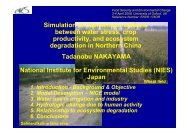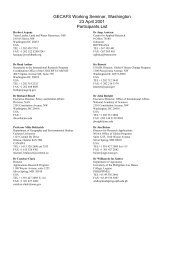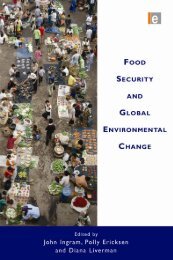Box 7 The GECAFS stakeholder survey.After about five years of project activities, GECAFS designed and conducted an email surveyintended <strong>to</strong> assess the effectiveness of reaching out <strong>to</strong> a broad user community (i.e. stakeholders), andalso <strong>to</strong> gather feedback on ways in which <strong>to</strong> better serve their needs in future.Questions covered a range of aspects including the nature of respondents’ interactions with GECAFSsuch as: Does/did your engagement contribute positively <strong>to</strong> your work? Are there any specific formsof interaction that you have had with GECAFS that you found particularly useful for your work? Canyou suggest any ways in which GECAFS can contribute more substantially <strong>to</strong> your work? And moregeneral issues such as: Who, in your opinion, should GECAFS seek <strong>to</strong> influence with its researchwork and findings? Can you suggest ways in which GECAFS can strengthen its presence amongnational and regional stakeholders in your region? To what extent, in your opinion, does GECAFScontribute <strong>to</strong> making linkages between science and policy-making? Can you suggest any ways inwhich <strong>to</strong> strengthen this contribution?Other questions cover a range of issues such as the nature and format of GECAFS workshops, thewebsite, and the desirability of a newsletter. Feedback was received from about 30 of the ca. 100recipients.Almost all the participants in the survey felt that their interaction with GECAFS had contributedpositively <strong>to</strong> their work in concrete ways, and many were able <strong>to</strong> cite specific examples (‘it expandedmy interaction outside the notion of climate change and agricultural production <strong>to</strong> a food system asdefined by GECAFS’).Most respondents felt workshops and meetings were the most beneficial form of interaction they hadwith GECAFS in the past, allowing for a better understanding of GECAFS concepts, as well aspresenting an opportunity for interaction with policy-makers and for networking (‘allowed interactionwith some of the finest scientists in vulnerability science, environmental economist, agriculturalproduction etc.’).In specific relation <strong>to</strong> stakeholder engagement, most of the respondents felt that GECAFS’ key targetgroups should be policy and decision-making communities at the global, regional and national levels,and the science community. Policy-makers specifically identified include politicians, PermanentSecretaries, Chief Technical Officers in ministries responsible for fisheries, agriculture, environment,industry and finance, and fisher folk leaders, agriculture department officials and opinion leaders inrural communities. In addition <strong>to</strong> the policy and science communities, other target groups identifiedby the respondents include donors; relevant practitioners and stakeholders including representatives ofagro-business, farmers, food consumers, producers and traders; international agencies such as FAO(United Nations <strong>Food</strong> and Agricultural Organization) and CGIAR; universities (researchers andstudents); media; NGOs; and relevant research and development institutions.Several respondents felt, however, that GECAFS outreach <strong>to</strong> these communities was limited. Somecited possible reasons for this – including the need <strong>to</strong> have something substantial <strong>to</strong> offer beforecommitting <strong>to</strong>o much time <strong>to</strong> outreach, in terms of both findings and resources for further research;the need for funding <strong>to</strong> carry out work at the regional and national levels, as it is difficult <strong>to</strong> reach out<strong>to</strong> politicians and other decision-makers without concrete results; and the difficulties in engaging84
communities (such as policy-makers) whose timescales are generally more immediate than those ofthe research community.Specific methods and <strong>to</strong>ols suggested by the survey respondents <strong>to</strong> improve GECAFS’ outreach andstakeholder interaction included:Identify and stick <strong>to</strong> a few themes.Involve stakeholders in designing research projects <strong>to</strong> create ownership of results.Develop smaller, more marketable projects for donor funding and greater stakeholderparticipation.Develop simulation models on food security and its socioeconomic impacts.Work with collaborative institutes (like CARDI) who work directly with policy-makers.Become a strong player in the work of the European Science Foundation.Develop a research programme with the CGIAR.Determine who the real decision-makers are in government – those who advise the policy level.Piggyback with relevant regional outreach activities.Organize regional workshops using research and papers already developed, with decision andpolicy-makers in attendance.Finally, the following questions serve as a checklist <strong>to</strong> help researchers undertake an ex postanalysis of their interactions with the regional policy process (adapted from Bammer, 2008b):What was the purpose of providing research support <strong>to</strong> policy and who was intended <strong>to</strong>benefit?What parts of the policy system were targeted and what research was relevant?Who provided the research support and how did they do it?What contextual (i.e. broader external context) fac<strong>to</strong>rs were important in getting theresearch recognized or legitimated?What was the outcome?ConclusionsThe ultimate aim of many GEC–food security research projects is <strong>to</strong> help people adapt <strong>to</strong> theadditional problems GEC will bring <strong>to</strong> achieving food security – which is, for many, alreadya complex challenge. For instance, the stated goal of the GECAFS project was drafted as ‘Todetermine strategies <strong>to</strong> cope with the impacts of global environmental change on foodsystems and <strong>to</strong> assess the environmental and socioeconomic consequences of adaptiveresponses aimed at improving food security’. ‘Determining strategies’ involves more thanproducing science outputs – it requires very active engagement with stakeholders <strong>to</strong> discussviability – an unviable plan (albeit scientifically robust) is not a particularly valuablestrategy! So, in order <strong>to</strong> achieve ambitious goals of this nature it can be helpful <strong>to</strong> clearlydifferentiate between research outputs, research outcomes and research impacts. This helps85
- Page 1 and 2:
From Food Production to Food Securi
- Page 3 and 4:
From Food Production to Food Securi
- Page 5 and 6:
Table of ContentsAbstract .........
- Page 7 and 8:
Paper 6: Undertaking Research at th
- Page 9:
AbstractFood security is a conditio
- Page 12 and 13:
2010 about 925 million people had t
- Page 14 and 15:
water) are used, and reduce negativ
- Page 16 and 17:
While the flow of the argument abou
- Page 18 and 19:
determine interactions along and be
- Page 20 and 21:
Paper 3: A Food Systems Approach to
- Page 23:
From Food Production to Food Securi
- Page 26 and 27:
concerns and are now issues that mu
- Page 28 and 29:
the relationships between GEC and f
- Page 30 and 31:
Theme 2 aims to understand how comm
- Page 32 and 33:
GEC and the Food System of the Indo
- Page 34 and 35:
Paper 2: The role of agronomic rese
- Page 36 and 37:
These advances have resulted from a
- Page 38 and 39:
Crop selection to determine mechani
- Page 40 and 41:
Agronomic science is central to imp
- Page 42 and 43:
Agronomic research in relation to f
- Page 44 and 45: The discussion above identifies a n
- Page 46 and 47: interventions and political inertia
- Page 48 and 49: While research on producing food ha
- Page 50 and 51: Box 1 Food system Activities and fo
- Page 52 and 53: In addition to broadening the debat
- Page 54 and 55: options. Examples already seen rang
- Page 56 and 57: Figure 3 Outcomes for 10 variables
- Page 58 and 59: Figure 4 Nine ‘planetary boundari
- Page 60 and 61: Figure 5 Environmental change, food
- Page 62 and 63: Table 1: Indicative analysis of the
- Page 65: From Food Production to Food Securi
- Page 68 and 69: Trade Agreement (NAFTA) and the Eur
- Page 70 and 71: Parry et al., 2005). Conducting foo
- Page 72 and 73: is provided in the ESF/COST Forward
- Page 74 and 75: Paper 5: Engaging Stakeholders at t
- Page 76 and 77: into actions (strategies, policies,
- Page 78 and 79: Box 2 Engaging with stakeholders in
- Page 80 and 81: Box 3 Setting the research agenda f
- Page 82 and 83: Third, and of considerable practica
- Page 84 and 85: Figure 2: Organizing and understand
- Page 86 and 87: organizations made up of numerous n
- Page 88 and 89: Elements of good practice in stakeh
- Page 90 and 91: Finally, it is worth noting that fo
- Page 92 and 93: development (Lee, 1999; Gunderson a
- Page 96 and 97: ‘break down’ what might be a hi
- Page 98 and 99: Paper 6: Undertaking Research at th
- Page 100 and 101: agriculture in many parts of the wo
- Page 102 and 103: gaps. The presence of a strong tech
- Page 104 and 105: an average of two years to coalesce
- Page 106 and 107: Institute for Meteorology and Hydro
- Page 108 and 109: Identifying case study sitesResearc
- Page 110 and 111: can both benefit from and contribut
- Page 112 and 113: Box 5 Mapping stakeholder interests
- Page 114 and 115: Holding planning meetings in locati
- Page 116 and 117: This reorientation of the debate fr
- Page 118 and 119: Importance of this type of research
- Page 120 and 121: Integrating the food system concept
- Page 122 and 123: awareness of the GEC issues within
- Page 124 and 125: pollutants were then introduced as
- Page 126 and 127: communities operating in food syste
- Page 128 and 129: Improving input-use efficiency acro
- Page 130 and 131: governance focuses on the range of
- Page 132 and 133: Developing research agendas in supp
- Page 134 and 135: The renewed approach to interdiscip
- Page 136 and 137: BIELAK, A., HOLMES, J., SAVGÅRD, J
- Page 138 and 139: EAKIN, H. 2010. What is Vulnerable?
- Page 140 and 141: GODFRAY, H. C. J., BEDDINGTON, J. R
- Page 142 and 143: INGRAM, J. S. I. & FERNANDES, E. C.
- Page 144 and 145:
LYUTSE, S. 2010. The One Billion To
- Page 146 and 147:
RAYNER, S. & MALONE, E. L. 1998. Hu
- Page 148 and 149:
UNDP 2006. The 2006 Human Developme
- Page 150 and 151:
activities “from plough to plate
- Page 152 and 153:
contribution to the science agenda:
- Page 154 and 155:
urgently needed, and - given the gr
- Page 156 and 157:
GECAFS plannenmakerij stelde vast d
- Page 158 and 159:
ieder hun eigen groep van betrokken
- Page 160 and 161:
het gebied van beheer hebben betrek
- Page 162:
Curriculum VitaeFollowing a BSc in



